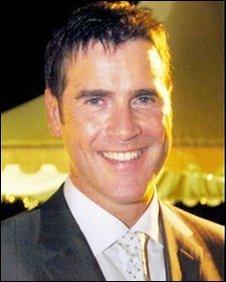I will sue the banks - Michael Taggart
- Published
A developer whose company folded despite once having assets valued at £500m has said he will sue banks over the way his business was handled.
With his brother John, Michael Taggart built a small sub-contracting firm into one of the biggest house-building operations in Ireland.
Mr Taggart is himself being sued by banks for millions of euros he gave in personal guarantees.
He believes his company was treated unfairly and he will counter-sue.
Taggart Holdings, which was also building houses in Great Britain and the Isle of Man, was put into administration in October 2008 when Ulster Bank and Bank of Ireland called in their debts.
Debts
At the time, it was widely quoted in the media that the company had debts of £170m.
However, Michael Taggart admits that figure significantly underestimates the company's debts, which he puts at about £300m - including a lot of money owed to sub-contractors and small businesses.
The Taggarts' business was one of the most high-profile casualties of the credit crunch and the crash in land and property prices.
For much of the past ten years, the business grew relentlessly to the point where the Taggarts were said to be personally worth £115m.
Michael Taggart said these years were characterised by a "great relationship" with the banks, to the extent that there were few, if any, disputes about how quickly the company was growing and how much it was borrowing to finance its progression.
He said the company strategy was to build in core population areas around Belfast and Dublin, avoiding more speculative developments in outlying areas.
An element of the firm's huge growth was the way in which it had borrowed money to build up a massive land bank to be used for future development.

Mr Taggart has started a new development business
At one stage its estimated value was £500m but the fall in prices meant that by 2008, it was worth significantly less than Taggart Holdings had paid for it.
Mr Taggart said that when banks began to realise their own wider difficulties, their attitude towards him and his business changed quickly and dramatically.
He is particularly unhappy with his treatment by Ulster Bank, with whom his company had enjoyed a long and profitable relationship.
The first signs of trouble were in June 2007 when Ulster Bank refused to pay cheques made out by the company worth approximately £200,000. This came after the bank said a Taggart company had breached the terms of a banking covenant.
Gun
Michael Taggart said he had already significantly reduced his company's overdrafts with the banks using his own money and therefore was surprised at the tough line the bank took.
"It was at that point, for the first time, that I felt a gun was being put to my head," he said.
Mr Taggart claims that later the bank made clear that unless he signed personal guarantees for millions of euros, his credit lines would be cut off.
The fact that the personal guarantees were sought just a few months before Taggart Holdings was put into administration clearly rankles with him.
He believes the banks moved too quickly and that he had a plan to pay them back if he had been given more time.
He said: "The banks brought the group down for £21m - we had demonstrated that given another 12 months we could have paid off the majority of that. That was also demonstrated by independent people - experts outside of our group."
He has sworn an affidavit, detailing his complaints against the banks and said the information contained within it will from the basis of his counter-claim against the banks.
Bank of Ireland told the BBC that for for reasons of client confidentiality, it does not discuss the financial affairs of individual customers while Ulster Bank had no comment to make.
'Complete bull'
Mr Taggart has also strongly criticised the way he was characterised by the media during the boom years.
Reports portrayed him as being particularly fond of travelling by helicopter and of having Lionel Ritchie and Van Morrison perform at his wedding near Dungiven.
He said a helicopter was the most viable way to manage 50 sites across Ireland and the UK.
"I live in Dungiven and a lot of my business was conducted in Dublin. Most people know that the roads between the two are not brilliant. It made sense in terms of saving time to travel by helicopter.
"I hate the things and apart from one trip to the Galway Races, I hardly ever remember using it for pleasure."
He says reports of Lionel Ritchie and Van Morrison being at his wedding are "complete bull" and that he believes he has enemies briefing untruths to the media in order to portray him in a bad light.
Mr Taggart, who is still involved in property development, said he remains determined to pay back the money he owes.
"I built up a business, I paid tax and I created jobs. I am not against meeting my obligations.
"What I am against and what I want to publicise is the manner in which the banks encouraged and fostered the business only to subsequently pull the rug from underneath me when times began to get more difficult."
Mr Taggart said there had been a failure to properly regulate the Irish banks and said some Irish bankers had been "self indulgent" during the boom but lacked the skills to deal with the crisis which engulfed the industry.
He said the banks had lent to too many people pitching "pie in the sky" projects and encouraged a situation where "a developer was born every day."